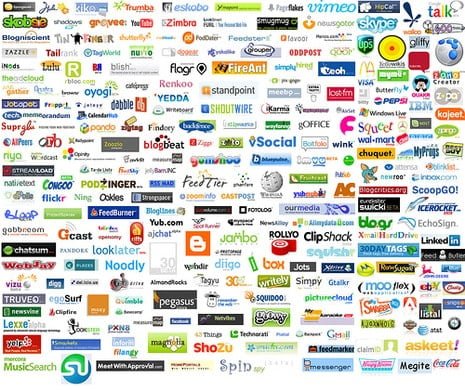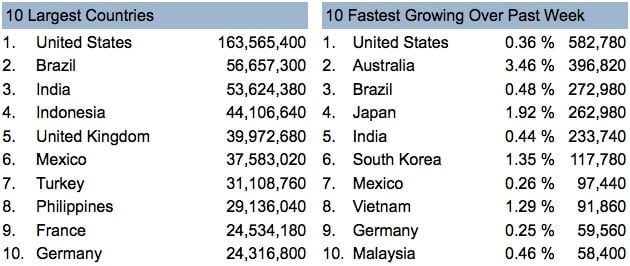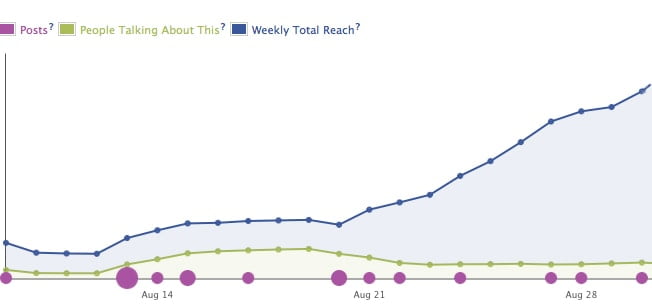
Social Media is quickly becoming the most powerful platform available to convey your branding and marketing messages. As time goes by companies, both large and small have had to not only ask themselves, “Should we have a social media presence?” (the answer here is a resounding “Yes”) but also, “How do we do it?” (do it, or do it RIGHT?). You see, social media is growing at an unprecedented, and completely unpredicted, rate. Although Social Media itself has been around for quite some time, most organizations and the general public have just started to embrace it within the past few years. Now everyone from your Grandmother to my neighbor’s cat has a social media profile – and they are ready to participate.
History of Social Media
The realm of social media began back in the early 80s, in the form of generalized online communities, such as The WELL (1985), Theglobe.com (1994), Geocities (1994) and Tripod.com (1995). There were also a plethora of BBS (bulletin board systems) in between that time as well. Bulletin Board Systems were computer systems that ran software, which allowed users to connect and log-in to the system using a terminal program. At the time they were quite cutting-edge and Mediaura’s CEO Andrew Aebersold operated a quite successful International BBS of his own in his high school years. These communities were created as a place for individuals to virtually “interact” with one another through the use of chat rooms and message boards. They provided a way for users to share personal information and ideas on any topics via publishing tools (which were a precursor to the blog phenomenon we have today). Many of these websites and ideas were quite ahead of their time. Did you know that “friend recommendations” were occurring all the way back in 1996 at PlanetAll.com?
By the end of the 1990s, the landscape of social media evolved along with the World Wide Web itself. The model changed from social media that users “participated” into one that users could manage themselves. This primarily started with the website Epinions.com, which used a system called “The Web of Trust” that allowed users to build social networks based upon whom they trusted. However, in 2002 with the development of Friendster, everything “social media” changed, as we knew it. Suddenly social media began to flourish, cause a new type of global phenomenon. Anyone who was an early adopter or user of Friendster can attest to its massive short-term growth – mostly because the system was always crashing due to high volume traffic. In fact, this is what helped motivate Tom Anderson and Chris DeWolfe to develop a little website you may have heard of called, MySpace. During this period, Linked-In also emerged, adding a professional slant to social media, carving out a niche for itself amongst all of the other social media websites that quickly began to appear. Facebook, for instance, began in 2004.
By 2005 MySpace had taken over and pretty much dominated the competition. At its height, MySpace was reported to have been receiving more views than Google and tech-savvy individuals knew that Social Media was changing the game for business. Unfortunately for MySpace, there were as many benefits as there were frustrations with the user experience. Zuckerberg and Co. saw where the other platforms were falling short, and decided in 2006 to open its unique social media experience to the general public. These days you would be hard-pressed to find anyone who doesn’t know what Facebook is (or doesn’t have a profile). Other companies have seen the potential with social media and have tried to release their own endeavors (Google+ anyone?), but none so far have been able to challenge Facebook’s supremacy.
Just how big is Facebook?

This chart also doesn’t account for places such as Hong Kong, Singapore, Palestine or Taiwan, which are growing at an exponential rate!
However, with the long-anticipated release of Diaspora (a non-profit, distributed social network) a new revolution may be coming. In fact, the potential for Diaspora is so great that Mark Zuckerberg himself contributed an undisclosed amount to its Kickstarter campaign.
So with users rapidly engaging in social media (Twitter!), you would think that organizations and companies would take their branding and marketing potential more seriously than they do. While some have recognized the need for a professional social media manager, unfortunately, many do not…and they are missing out on a lot of potential growth.
Here’s part of a wonderful Infographic from Infographic Labs that shows just how important Facebook has become to the global community.

What To Do
As I said earlier; companies are now “getting in the mix” of Social Media, but they are approaching it incorrectly. Some organizations think, “I have my own social media page (often the audience is their 50-100 friends and family members), so I can handle my company’s social media as well.” For some individuals, they’re right…but for most people, they’re sadly mistaken. For instance, I can drive a car. I can drive a car *really* fast when given the opportunity, but that doesn’t qualify me to compete in NASCAR or Formula 1. I leave that to the professionals. This is why it is so incredibly disheartening to see businesses and organizations with so much potential regulate their Social Media Management to an “In-House” employee; who is more-often-than-not merely a junior-level team member. That’s like handing over the greatest tool in your marketing arsenal to someone with absolutely no experience in how to properly realize its full potential. Sometimes I wonder, do these companies even realize their mistake? Are they just not taking Social Media seriously? Do they simply not understand it? Do they think it’s trite or only for a certain demographic? There are some serious flaws to this whole setup that can be quickly eliminated by hiring an outside social media manager and/or consultant for your business.
I often ponder how many of these social media managers are well-versed in things such as Transmedia Storytelling? What is their experience as a content strategist? How long have they themselves been utilizing Social Media? How many platforms are they on?
All of this is vital because different user demographics often favor certain social media platforms. So if you’re only focused on ONE or you only know how to properly engage users through one (or two) mediums; then you’re missing so much more of the pie that is out there. Look at that top image at the start of the blog entry…that is only a sample of the Social Media platforms that are available. I’m not advising you to join all of them (you really don’t have to), but how many of your current social media strategists even know that they exist?
What Are The Advantages?
With the economic atmosphere the way that it is, most businesses are trying to cut costs where they can, and for those that undervalue social media, they’ve elected to delegate that to someone “in-house” in order to save money. But what if I were to tell you, that it may actually be COSTING you money (and potential clients)? You’re probably feeling a bit skeptical right now, but let me explain.
Experience Has Value
I offered just a very brief overview of social media’s development over time, but trust me when I say there is a lot of value in knowing that history. The realm of social media is organic and is constantly (and rapidly) evolving on a daily basis. Social Media is more than just “posting a status update” or “linking to a cool article”. It’s about staying-on-top of the latest management tools, being informed on the most cutting-edge optimization strategies, outreach programming, Transmedia Storytelling, content strategy, demographic engagement, branding, marketing, etc. It is imperative that the person who is managing your social media is aware of the best practices (which too, evolve constantly) and are able to predict upcoming industry changes. I remember recently speaking to someone who was in charge of a Medium-sized company’s social media, and when we started speaking about Facebook’s Timeline, she was completely unaware of about 80-85% of the advantages to the new system. She thought Timeline just allowed you to have a cover photo and rearranged your wall content. Of course, this is just one example, but it’s one example of many.
It takes dedication, tech-savvy know-how, and creative thinking to be a real player in the social media sphere. Remember, your goal should not be simply to “sell” your business but grow your brand in the community. A professional social media manager is a solution that keeps your outward-facing brand updated and professional, without your marketing department taking a hit because someone wasn’t really qualified for the task they were assigned. Don’t let your organization be one of the THOUSANDS that are stagnating in growth (or missing on growth opportunities) because your social media presence isn’t being managed properly.
Branding
Another thing that I see social media “managers” doing wrong is that they don’t understand their brand’s tonality and voice; so instead of coming across as engaging and drawing consumers in – they’re dry and ineffective. You can’t talk AT your audience, you have to talk WITH them, and there is also a subtle nuance to doing it correctly. A professional social media partner will be able to manage your social media presence in such a way that your brand develops its own voice and identity. Your “brand” will gain its own identity as a presence on the web. Another benefit to partnering with an agency is that you will gain the insight of response reports and 24/7 monitoring. Anyone who engages in social media can attest that having a real-time and scalable crisis-management team on guard can be a proverbial “lifesaver” in times of turmoil or an unsatisfied client/customer.
Perspective
Another benefit to partnering with an agency in regards to social media is that they can bring additional insights to your company that you most likely would not discover whilst managing your properties in-house. An outside social media management company can bring insights to your business that you wouldn’t discover when managing things in-house. Remember, it’s their job to stay-on-top of the latest trends and advances; this means that they are able to draw on their experiences from other clients as well as offer advance on a new strategy. It’s like having a pair of fresh eyes (or several) whose job it is to help raise the level of your brand; someone who will be able to point out potential opportunities that may have been missed or they can offer a plan-of-action based on what has worked/not worked for others in the past. Divergent thinking means more potential solutions, increasing your business’s chance of making the best decisions. If your social media manager is “in-house” they are most likely going to be repeating the same mistakes.
Cost-Savings
I know this one seems as if it should be the opposite, but partnering with an Interactive Partner with Social Media Marketing/Strategy expertise IS going to save your business money. A lot of organizations elect to delegate their social media to their company’s marketing branch and consistently I see it costing both their marketing and their social media. The reality is that monitoring, actively responding to, and maintaining your company’s social media presence, as well as researching and surfacing opportunities to grow your business is a full-time endeavor. Most businesses that deem an internal team member don’t realize that this approach will inevitably cost them far more in the long run and often provide them with much less. Aside from the obvious costs of hiring a new employee (salary, benefits, taxes, etc), you’ll have to also absorb the hidden costs like proper training and the overall perks that can fall somewhere else within your company’s budget. Sure, they may be capable and proactive, but again, they are one individual – by partnering with an Interactive Agency with Social Media Management & Marketing experience, you’ll reap the benefits of having a whole group of people whose experience and advice will come into play.
Think about it like this, if your company was going to develop its own unique branding and advertising would you hire one person to do it all or would it be better to have an entire team of people at your disposal working to create something innovative and memorable for your business? Social Media Management is about building your audience, gaining market share, and optimizing your social media content in a compelling manner.
Here is an example from one of our clients. They came to Mediaura looking to increase their Social Media because while it was steady it simply wasn’t growing at the pace they would have liked to see. After working closely with their team to learn about their goals, current strategy, and brand identity, we were able to raise their social media to reach far beyond what they had previously thought possible.

As you can see, partnering with a professional has its benefits.
Knowing What To Do
Professional Social Media Strategists do far more than merely post content. There are a wide variety of tools and software packages designed to increase your social media procedures. The difference between a professional and a casual (albeit prolific) user, is that the professional not only knows what these tools are but they are able to select the ones that align with your business goals. If necessary, they are also able to custom-build applications to enhance the user-interface and increase your ROI. Another added benefit is that when a company (such as Mediaura) buys or manages things such as ads on a larger scale (i.e. for multiple clients) there are increased benefits that you would not receive otherwise. These are things that are only available to companies who deal with social media on a professional level and specialize in the field. And a professional partner will be able to recognize the strategies and methods being used by your competitors. This type of experience means that whether it’s an unexpected hurdle that arises from a customer, a competitor encroaching on your territory, or simply raising your brand’s presence in the marketplace – the professionals know what to do and don’t waste time having to figure it out.
Conclusion
These are only a few of the reasons that partnering with an Interactive Company specializing in Social Media management is so important to a company’s overall business model. Social Media when done correctly, goes viral. And if you don’t think that focusing on social media can increase the bottom-line here are just a few numbers to look at:
- Sony announced in February that through Twitter they had earned an extra 1.5 million dollars in sales.
- Dell announced last year that its social media presence accounted for 4.7 million dollars in increased sales.
For those of you who would argue that these companies already have significant brand identity, here is another example:
- John Fluevog Boots & Shoes Ltd, a small Canadian shoe company reported a 40% increase
As we’ve touched-base on before, Mediaura has the experience, technical skillsets, and a rich history of social media experience. So if you’re looking for a company to help you with your current social media strategy…look no further.
Give us a call today!

